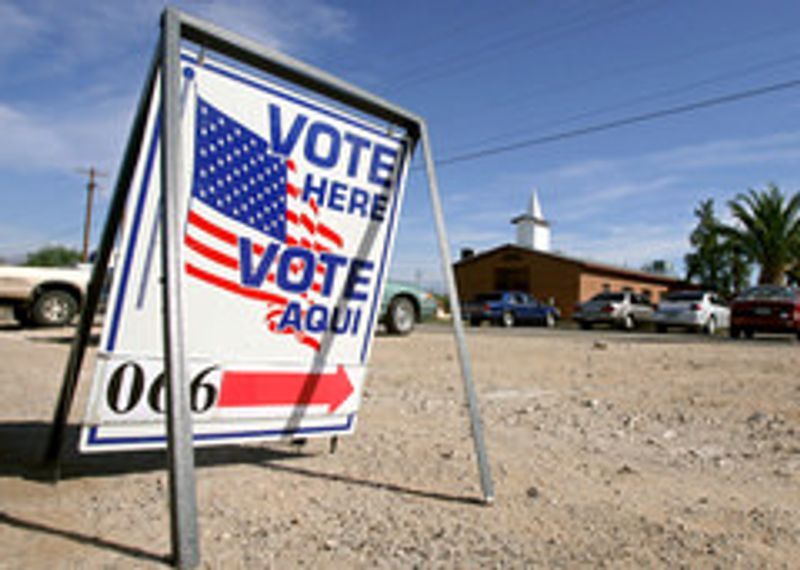Press Release
Asian Americans Urge U.S. Supreme Court to Strike Down Arizona’s Discriminatory Voter Proof of Citizenship Law And Uphold the National Voter Registration Act

The Asian American Legal Defense and Education Fund (AALDEF) filed an amici curiae brief in the U.S. Supreme Court in Arizona v. Inter Tribal Council of Arizona, challenging the legality of Arizona’s Proposition 200, the state’s new restrictive voter registration law. AALDEF contends that Proposition 200 will unfairly burden naturalized citizens, who make up almost 40% of the state’s Asian American population.
“All eligible citizens, either naturalized or native-born, should have equal access to the electoral process,” said Glenn D. Magpantay, Director of AALDEF’s Democracy Program. “The barriers that naturalized citizens encounter as a result of Proposition 200 run contrary to federal laws that were passed to eliminate such barriers to voting.”
The brief was filed by AALDEF and pro bono co-counsel Milbank, Tweed, Hadley & McCloy LLP, on behalf of AALDEF and 12 other Asian American organizations that conduct voter registration drives in states with laws similar to Arizona’s or whose state legislatures are considering such laws. These restrictive laws will make voter registration more burdensome for Asian American voters and will impair the ability of grassroots groups to register Asian American voters. Currently five states have unlawfully onerous voter registration provisions (AZ, GA, AL, KS, TN), and 12 other states are considering such laws.
The U.S. Court of Appeals for the Ninth Circuit struck down the Arizona’s Prop 200 law, finding that it violated the National Voter Registration Act (NVRA). Congress enacted the NVRA to promote voter registration and to eliminate state-imposed voting requirements because they “disproportionately harmed voter participation by various groups including racial minorities.” The NVRA established a national form for voter registration, with a clear provision that no additional requirements may be imposed by the states. The 9th Circuit Court of Appeals held that Prop 200’s additional requirements for documentary proof of citizenship directly violate the NVRA’s clear provision. The case was then appealed to the Supreme Court.
Arizona’s Proposition 200 imposes additional registration requirements in a clear violation of the NVRA. Moreover, it violates the purpose of the NVRA by imposing unequal burdens on foreign-born, naturalized U.S. citizens who are registering to vote. The Arizona law includes a requirement that a new voter submit documentary proof of citizenship. While native-born citizens may mail copies of their U.S. birth certificates with their voter registration applications under Prop 200, naturalized citizens do not have the same option and must register in person and bring their naturalization certificates with them to the county registration office.
Asian Americans are disproportionately affected by Prop 200’s documentary citizenship requirements because a high percentage of them are naturalized citizens. Almost 40% of the approximately 194,475 Asian Americans living in Arizona (approximately 69,817 Asian Americans), are foreign-born naturalized citizens who could encounter the barriers of Prop 200 when registering to vote. By contrast, only about 5% of white non-Latino citizens are foreign-born naturalized citizens.
Proponents claim that the requirement is needed to prevent non-citizens from voting in U.S. elections, but there have been almost no incidents of non-citizens voting in U.S. elections or registering to vote. Moreover, the federal form contains sufficient safeguards that prevent non-citizens from voting in U.S. elections, including that the applicant must swear and sign an oath, under penalty of fines and imprisonment, that he or she is a citizen of the United States. The penalty for a non-citizen to fraudulently register to vote may also result in deportation.
Further, the federal voter registration form is particularly beneficial to Asian Americans because it is translated into Asian languages. In states that do not translate their state voter registration forms, voters may use the federal form which is translated into Chinese, Korean, Vietnamese, and Tagalog.
“Prop 200 will make the efforts of organizations to register Asian American voters in Arizona far more difficult,” said Magpantay. “We urge the Supreme Court to strike down this unlawful and discriminatory voter suppression law.”
In addition to AALDEF, the organizations listed as amici on the brief are as follows:
Alliance of South Asian American Labor
Asian and Pacific Islander American Vote – Michigan
Center for Pan Asian Community Services, Inc.
Chhaya Community Development Corporation
Chinese Community Federation of Atlanta
Coalition of Asian Pacific Americans of Virginia
Korean American Civic Empowerment
Korean Americans for Political Advancement
MinKwon Center for Community Action
Organization of Chinese Americans – Georgia
Organization of Chinese Americans – Greater Houston
Taking Our Seat
For more information, see AALDEF’s fact sheet on proof of citizenship laws.
AALDEF’s amicus brief can be found here >
Contact:
Ujala Sehgal
212.966.5932 x217
usehgal@aaldef.org
The Asian American Legal Defense and Education Fund (AALDEF), founded in 1974, is a national organization that protects and promotes the civil rights of Asian Americans. By combining litigation, advocacy, education, and organizing, AALDEF works with Asian American communities across the country to secure human rights for all.
